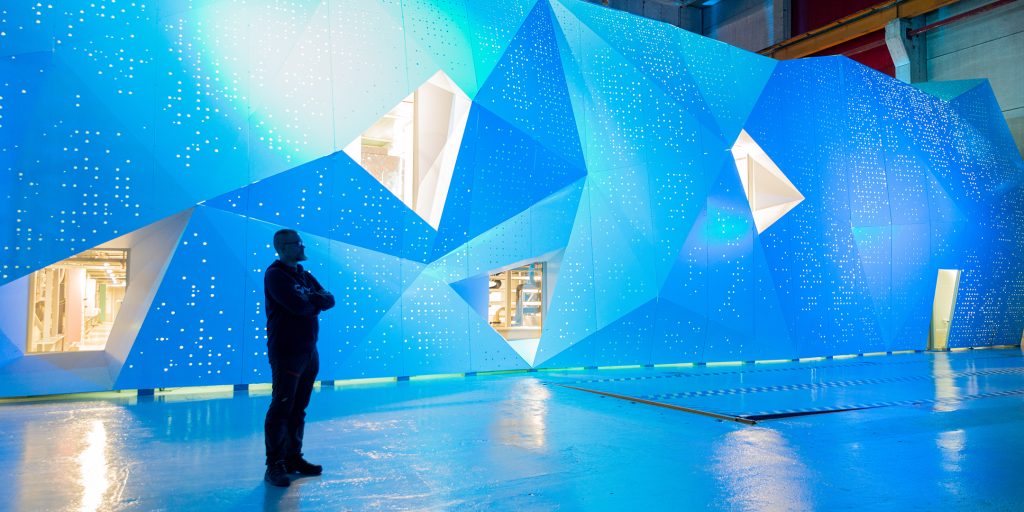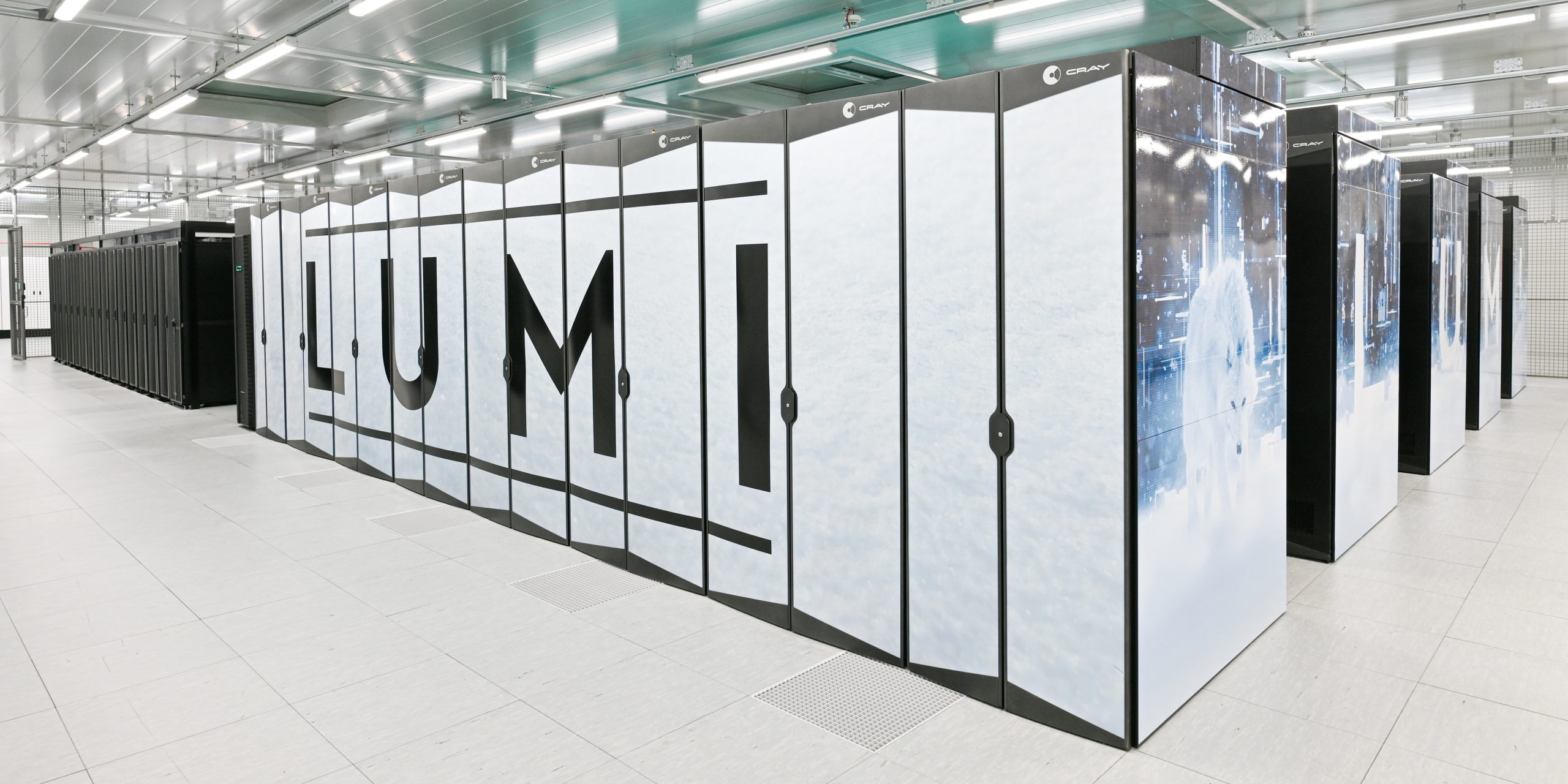
High-performance computing offers companies a boost and competitive advantage
Finnish companies can tap into the outstanding computing power of the LUMI supercomputer for their product development and innovation. In addition to computing resources, we provide companies with expert support for deployment, training, and assistance with submitting funding applications, free of charge.
Versatile supercomputer
Twenty per cent of Finland’s national capacity on the LUMI supercomputer, which is owned by EuroHPC and 11 European countries, is reserved for companies. This is a significant national investment that boosts business competitiveness. LUMI’s computing capacity enables companies to use modern methods, such as high-performance computing, simulation, AI and data analytics. LUMI is one of the world’s most significant AI platforms.
Examples of fields in which LUMI’s computing capacity can be used:
Machine learning
Machine learning is an area of artificial intelligence that efficiently automates the construction of analytical models. It can, for example, be used to support decision-making or to improve the efficiency of production processes. Machine learning algorithms identify patterns in data and help data scientists solve problems. Machine learning requires a large computing capacity.
In machine learning, algorithms are used to identify data models, which can then be used to generate predictions and forecasts. Machine learning algorithms can predict values, identify unusual events, define structures, and create categories. For example, machine learning can use customer data and identify behavioral models for optimizing product recommendations and providing the best possible customer experience.
Computational fluid dynamics
Computational fluid dynamics deals with simulations of gas and liquid flows. It utilizes high-performance computing to produce a precise numerical solution for equations describing the movement of a liquid or gas. Computational fluid dynamics is needed in conducting basic research on fluid dynamics, designing complex flow configurations, and predicting interactions between chemical substances. Its application areas include aerodynamics, space and aviation research, weather simulations as well as engine and combustion analysis.
Data management and analytics
Our supercomputers have plenty of memory, and their high processing capacity makes it possible to turn data into meaningful information, output forecasts and recommendations. CSC has expertise in distributed data processing, data integration and data analytics. We can provide impartial advice on the best commercial and open source solutions available.
Natural language processing
Natural language processing is an area of linguistics, computer science and artificial intelligence that deals with interactions between computers and human language, especially programming. The goal is to create a computer that can ‘understand’ document contents, including the contextual nuances of their language. This technology can accurately extract information and insights contained in documents as well as classify and organize documents.
A supercomputer is needed in natural language processing to analyze large volumes of natural language data. Its challenges often involve speech recognition as well as understanding and producing natural language.
Genomics
Genomics is transitioning from a research-driven field to activities led by health care organizations. It has been predicted that health care providers will be producing the majority of genomic data in the near future. In order to maximize the value of genomic data, it is essential that data can be shared between organizations and across national borders. Research is strongly dependent on computing power, and our understanding of the genome has been identified as a major factor in health care development.
Drug research
Drug development is a long process in which comprehensive computational methods can be used to focus expensive experimental phases on molecules that are the most likely to be effective. Atomic models can be used to study how medicinal substances bind with and affect target molecules or to test different hypotheses. While modeling has been used in the different research phases of pharmaceutical research for a long time, the capacity offered by supercomputers makes it possible to analyze enormous quantities of molecules at an unprecedented rate. In addition, the most sophisticated methods now produce accurate results from a smaller selected group of molecules at a faster rate than laboratory tests – and without the chemical waste.
Chemistry
The details of many chemical processes of industrial importance can be modeled using atomic-level methods, which include molecular dynamics and density functional theory. For example, simulations can be used to determine the operating mechanisms of catalysts as well as the properties of mixtures and solutions or their behavior on surfaces. This understanding can be used to create new, more efficient catalysts or to optimize process conditions. The power of supercomputers makes it possible to build and use models that have significance in the real world.
Quantum computing
Quantum computers are revolutionizing research and development that utilizes computational modelling. Due to a completely new way of computing, quantum computers can solve some problems much more efficiently than classical supercomputers. In order to take advantage of the computational power of quantum computers, problems must first be reformulated in a form that is amenable for quantum computing. Particularly suitable applications for quantum computers are, e.g., financial modelling, risk analysis, machine learning, molecular and materials sciences, as well as logistics and optimization problems in general. Together with VTT and Aalto University, CSC maintains and develops the Finnish Quantum-Computing Infrastructure FiQCI. FiQCI harnesses the combined power of supercomputers and quantum computers, and provides our customers with a development and testing platform for quantum computing.

How can businesses access LUMI resources?
Businesses can access LUMI’s resources in many ways:
Company pays for the use
When the research project results are the property of company, it makes a contract and pays for the use according to the service price list.
In cooperation with higher education institutions or public research institutes
When the RD project is led by a research institute or higher education institution:
- LUMI’s resources can be used free of charge if the project results are published in keeping with scientific practice.
- If the results are not public, the fee set out on the service price list will be charged for using LUMI.
Tapping into Business Finland funding
If the company has a RDI project funded by Business Finland::
- It is possible for SMEs and Start-ups to have access to between €15,000 and €100,000 worth of LUMI’s computing capacity
- Large and medium-sized companies can include LUMI’s computing capacity in their project budget and receive funding for up to 40% of the costs.
The value of the computing capacity is determined according to the service price list.
With support from international funding program
The European High Performance Computing Joint Undertaking’s (EuroHPC JU) has opened a continuous call for AI and Data-Intensive Applications. The call is intended to serve industry organizations, small to medium enterprises (SMEs), startups, as well as public sector entities, requiring access to supercomputing resources to perform artificial intelligence and data-intensive activities.
The call aims to support ethical artificial intelligence, machine learning, and in general, data-intensive applications, with a particular focus on foundation models and generative AI, e.g. large language models.
The EuroHPC supercomputers provided for this call are LUMI, MareNostrum5, Leonardo, Meluxina, Karolina and Vega.
The call is continuously open, with pre-defined cut-off dates for proposals. Read more about the call from EuroHPC JU homepage.
Try & Buy – try it for free for your business purposes
The company can start using the LUMI computing service in a ‘Try&Buy’ project, in which you can try out LUMI’s suitability for your purpose and test it before making the investment.
A test project includes
- a LUMI project and credentials for two users
- CPU, GPU, and storage resources for testing
- expert support for LUMI project deployment.
A test project will be available for a limited period of time. After the test project, the company can continue using LUMI by signing a contract for the use of computing services with CSC and purchasing computing resources for an existing project for a fee set out on the service price list. Alternatively, the company may decide to give up using the supercomputer after the test phase without incurring charges.
Service price list
| Service | EUR, VAT 0% |
| Setting up a LUMI computing service project | 1.000,00 € |
| Nodes containing LUMI-C CPU processors (AMD Milan) – 1 CPU node hour (node-h) corresponds to 128 CPU core hours (core-h) | 0,57 € / CPU-node hour |
| LUMI-G – GPU- (AMD MI250) graphics processors | 0,535 € / GPU hour |
| LUMI-storage unit | 0,005 € / TiB/h |
| Please note 1 TiB stored for 1 hour in LUMI-P consumes 1 TiB-h 1 TiB stored for 1 hour in LUMI-F consumes 3 TiB-h 1 TiB stored for 1 hour in LUMI-O consumes 0,25 TiB-h |
Contact our experts to find out more about financing options. We can help you establish contacts with higher education institutions and research institutes.
Expert support and training
An ability to offer comprehensive expert assistance for using the services and for developing the client’s competence is at the core of CSC’s work.
User support
Practical computing environment support is delivered by the LUMI User Support Team, which provides help in areas such as installing computational applications.
Field and methodology-specific support is also available from CSC, such as for using computational applications, workflow planning or data management.
Training and courses
We offer a range of courses and self-study materials that are useful when you are starting high-performance computing. We can also tailor a compact package that suits your needs and matches your particular interests and starting level.
Collaboration in Finland and Europe
We collaborate with national and EU networks and actors.
Our common goal is to spread awareness of new High-Performance Computing and AI technologies and transform this awareness into action for companies and researchers. We are continuously developing our networks and looking for partners to support our activities.
Our collaboration networks
EuroCC FINLAND – National Competence Center
The EuroCC Finland competence center is part of the EuroCC project, which aims to establish national HPC competence centers in different European countries. CSC’s role in the project is to support and improve the capabilities of Finnish users to utilize the possibilities of high-performance computing, data analytics and artificial intelligence. Our service is aimed especially at the use of industry and SMEs. Read more about EuroCC.
Finnish Center for Artificial Intelligence
The Finnish Center for Artificial Intelligence (FCAI) is a cluster and a flagship designated by the Academy of Finland that brings together top researchers and actors from industry and the public sector to solve real-life problems using both existing AI expertise and entirely new AI methods. Read more about the Finnish Center for Artificial Intelligence.
Business Finland
Business Finland services cover areas such as innovation funding and internationalization. Business Finland helps its business customers grow and succeed at the global level, develop future solutions, and boldly reshape their business. It aims to promote cooperation between companies and research groups. Visit Business Finland website.
DIMECC
DIMECC is an open collaboration platform that enables the technological and commercial renewal and growth of companies. Visit DIMECC website.
TIVIA
TIVIA is a Finnish Information Processing Association operating in the IT sector. The aim of TIVIA is to raise awareness of Finnish IT expertise and to provide its members with opportunities for competence development, networking, presenting their services, interacting extensively with top experts and building international contacts. Visit TIVIA website. (Only in Finnish)
AIKA – Digital Innovation HUB
AIKA DIH – Digital Innovation Hub is an ecosystem that offers companies in Kainuu and northern Finland support for the digital business transition and the development of new innovative solutions. Through the partners operating in the AIKA ecosystem, companies can benefit from the latest digital technologies such as artificial intelligence, supercomputing and data analytics in business and product development. The AIKA ecosystem is supported and partially financed by the city of Kajaani and the Regional Council of Kainuu with the help of the European Regional Development Fund (A78688). Visit AIKA ecosystem website.
Finnish AI Region
The Finnish AI Region, or FAIR, offers businesses low-threshold expertise in artificial intelligence, augmented reality, high-performance computing, and cyber security. FAIR aim to accelerate and expand the adoption of artificial intelligence in small and medium-sized enterprises. Most of FAIR´s services are free of charge. FAIR consists of ten partner organizations that provide its services as a network. Read more about Finnish AI Region.
Location Innovation Hub
The objective of the Location Innovation Hub (LIH) is to advance the use of artificial intelligence, high-performance computing, cybersecurity and advanced digital skills by applying location intelligence. Read more about Location Innovation Hub.
The AI Finland Network
The AI Finland network operates under the umbrella of the Technology Industries of Finland, which brings together companies and other actors interested in artificial intelligence, regardless of industry or size. The aim of the network is to speed up the application and development of AI, for example, through peer sparring and cross-industry information sharing. The aim is also to cooperate extensively with universities and other key actors and to launch joint projects.
Read more about AI Finland Network
EuroCC Finland
EuroCC Finland is a national HPC competence center, operated by CSC. EuroCC Finland offers resources for high-performance computing. Our specialists will help your business to adopt HPC.
Our services are specifically targeted at industry, SMEs and start-ups.

LUMI AI Factory
LUMI AI Factory offers a range of services that include AI-optimized high-performance computing resources, data, training, and technical support. The LUMI AI Factory serves as a shared platform and accelerator for R&D activities of companies, research groups, and public organizations. The services are free of charge for researchers, startups, and SMEs.

Training
CSC Summer School in High-Performance Computing 2026
Contact information

Pekka Uusitalo
Pekka Uusitalo is leading CSC’s Industry Engagement unit promoting industrial HPC use.

Dan Still
Dan Still works with building industrial partnerships and networks to boost industrial HPC use.

Susanne Sjöblom
Susanne Sjöblom is a Customer Solution Manager for commercial customers and promotes collaboration between research organisations and industry to benefit from HPC.

Morthen Mathisen
Morthen Mathisen is responsible for the industrial simulation and AI customers.

Jyrki Savolainen
Jyrki Savolainen is responsible for supporting the implementation of high-performance computing for companies and the development of data analytics, especially in the Northern Finland region.

Mikko Kerttula
Mikko Kerttula promotes LUMI industrial use especially in Northern and Eastern Finland. In addition, he supports the development of the Kajaani data center ecosystem.
Jussi Auvinen
Jussi Auvinen promotes LUMI industrial use in Eastern and Central Finland.

Tiina Leiponen
Tiina Leiponen promotes the LUMI industrial use and the RDI collaboration between companies, higher education institutions and research institutions.



